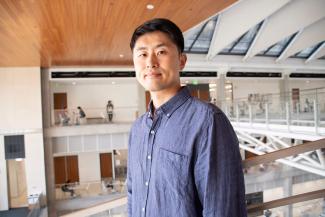
Linran Fan, assistant professor in the Chandra Family Department of Electrical and Computer Engineering, is one of six University of Texas at Austin faculty members that were announced today as recipients of Sloan Research Fellowships from the Alfred P. Sloan Foundation, putting UT Austin at the forefront among public universities boasting winners this year.
UT’s other 2025 Sloan Research Fellows are Edoardo Baldini, an assistant professor of physics; Joe Kileel and Maggie Miller, both assistant professors of mathematics; David J. Wu, an assistant professor of computer science; and Xue-Xin Wei, an assistant professor of neuroscience.
Each year, the Sloan Foundation selects fellows based on their creativity, independent research and potential to become future leaders in their respective fields. Since its establishment 70 years ago, the fellowship has become one of the most prestigious awards available to early-career researchers.
“These outstanding faculty members are leading some of the most exciting early-career research projects anywhere on the continent, and we are incredibly proud to call them Longhorns,” said Rachel Mersey, executive vice president and provost. “Receiving a Sloan Research Fellowship is a testament to both their individual excellence and the colleges, schools and departments that helped bring such promising talent to our campus and community.”
Past fellows have gone on to receive major accolades, including Nobel Prizes and National Medals of Science. This year’s cohort includes 126 scholars from 51 institutions across the United States and Canada, selected from among more than 1,000 nominated individuals.
“These extraordinary scholars are already making significant contributions, and we are confident they will shape the future of their fields in remarkable ways,” said Adam F. Falk, president of the Alfred P. Sloan Foundation.
Fan’s research focuses on nonlinear interactions between optical photons, superconducting circuits, electron spins and acoustic waves at the quantum level. Using a hybrid system of novel, light-based devices and materials and quantum principles, he aims to improve precise measurements, communication and information processing.
The Sloan Research Fellowship provides recipients with a two-year, $75,000 grant to support their research. Among the more than 1,000 researchers nominated for fellowships were chemists, computer scientists, Earth system scientists, economists, mathematicians, neuroscientists and physicists. Independent panels of senior scholars select Sloan Research Fellows based on their research accomplishments, creativity and potential to become a leader in their field.
Among public institutions, no university had more Sloan Fellows this year than UT, though the University of California Los Angeles and University of California Berkeley tied. Including this year’s winners, 107 faculty from UT Austin have received a Sloan Research Fellowship since the awards began in 1955.
